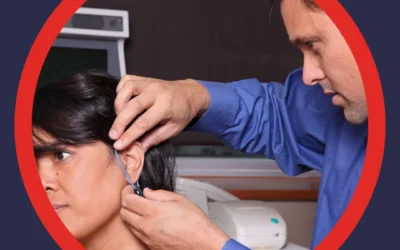Dangers of Untreated Hearing Loss
Hearing loss often goes unnoticed, leading to severe health consequences. Many individuals delay treatment, unaware of the risks. While hearing loss itself is not life-threatening, untreated hearing loss can significantly impact your quality of life and lead to serious health issues.
Cognitive Decline, Dementia, and Hearing Loss
Research has shown a clear connection between untreated hearing loss and cognitive decline. A study from Johns Hopkins revealed that older adults with hearing loss are at a higher risk of developing dementia. The study followed 639 adults over a decade and found that those with hearing loss had a two to five times greater risk of cognitive decline. This could be due to the mental strain of trying to decode sounds or the social isolation that often accompanies hearing loss. Fortunately, hearing aids have been shown to improve cognitive function and may delay or prevent dementia.
Key Takeaway: Treating hearing loss early with the best hearing aids for elderly people can protect your brain from unnecessary strain and potential cognitive decline.
Depression and Social Isolation
Untreated hearing loss can also lead to emotional and mental health problems, including depression and social isolation. The National Institute on Deafness and Other Communication Disorders (NIDCD) found that individuals with untreated hearing loss are more than twice as likely to experience depression. Social isolation often accompanies this, as hearing loss makes it harder to participate in conversations, leading people to withdraw from social activities.
Key Takeaway: Wearing hearing aids can help prevent social isolation, reduce the risk of depression, and improve mental well-being.
Increased Risk of Falling
In addition to cognitive and emotional challenges, untreated hearing loss significantly increases the risk of physical injury. A study by Johns Hopkins found that even mild hearing loss can triple your chances of falling. Reduced awareness of your surroundings can lead to tripping, stumbling, and more frequent accidents.
Key Takeaway: By treating hearing loss, you can maintain better balance and spatial awareness, decreasing your risk of falls.

Impact on Income and Employment
Hearing loss doesn’t just affect your health—it can also impact your career. A study by the National Institutes of Health found that untreated hearing loss can result in less educational attainment, lower income, and more unemployment than individuals with normal hearing or those using hearing aids. Additionally, untreated hearing loss doubles the unemployment rate compared to individuals who use hearing aids.
Key Takeaway: Treating hearing loss not only enhances your personal life but can also boost your professional success.
Heart Disease and Hearing Loss
Your heart health and hearing are closely linked. Studies have shown that poor cardiovascular health can affect hearing because of restricted blood flow to the inner ear. In fact, researchers have found that individuals with heart disease are more likely to experience hearing loss than those with healthy hearts.
Key Takeaway: Managing your cardiovascular health can help protect your hearing. Early intervention is essential.
Other Health Conditions Linked to Hearing Loss
Untreated hearing loss has also been linked to various other health problems, including:
- Diabetes: There’s a link between diabetes and hearing loss.
- Chronic Kidney Disease: Over half of patients with moderate chronic kidney disease suffer from hearing loss.
- Increased Hospitalizations: Untreated hearing loss can lead to more frequent emergency room visits and hospitalizations.
Key Takeaway: Your hearing health is directly connected to your overall well-being. Addressing hearing loss can help reduce the risk of developing other serious health conditions.

Protect Your Health by Addressing Hearing Loss
Ignoring hearing loss doesn’t just impact your hearing—it can affect your entire life. From cognitive decline and depression to physical falls and heart health, untreated hearing loss can lead to serious consequences. Fortunately, hearing aids can provide significant improvements in your quality of life.
Take control of your health today. Contact American Hearing + Audiology to schedule a free hearing evaluation. Our experienced audiologists will help you understand your hearing needs and recommend the best course of action. Don’t wait—protect your health and improve your quality of life.



